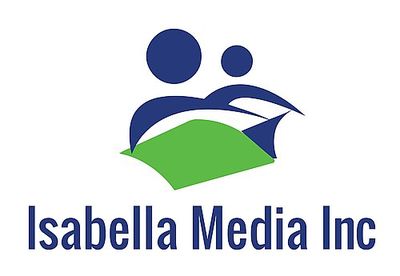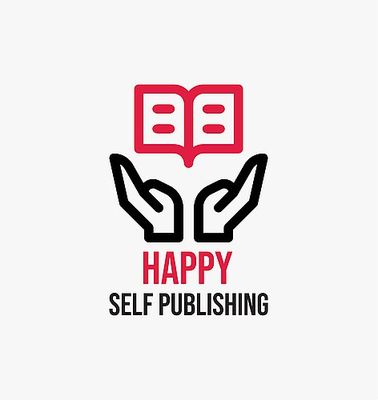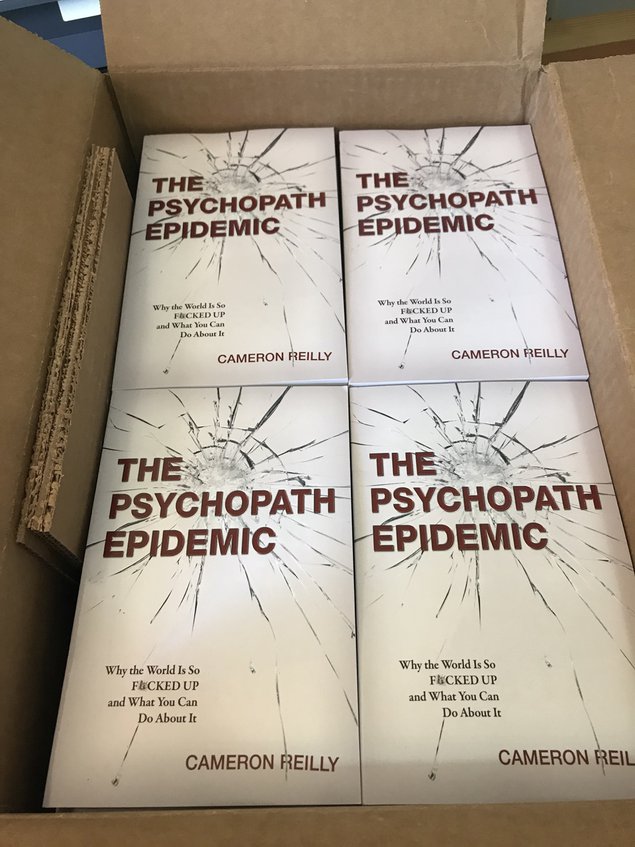Why the world is so crazy and what we can do about it.
Psychiatrists estimate that 1% of the adult population are psychopaths. In the United States, this is nearly two million adults. Where might these people be hiding?
Ended
Every day in the news we hear about people in positions of business, political and religious leadership doing deplorable things – sexual harassment, polluting the environment, lining their own pockets at the expense of their employees and customers, raping children and covering up crimes. The common explanation is that they are just “bad eggs” – normal people who have gone astray for reasons unknown. However, we believe there is a better explanation.
Psychiatrists estimate that 1% of the adult population are psychopaths – people physiologically incapable of empathy, who crave risk, are often charismatic, and who possess an extreme desire for wealth and power. In the United States, this 1% would be nearly two million adults. Where might these people be hiding?
The premise of this book is that these psychopaths are quite possibly to be found occupying senior management positions in many of our institutions and organisations, wielding enormous power. In other words, our economy is run by psychopaths. If that is true, then we need to build systems that protect us from their behaviour. The book examines the evidence and then suggests solutions for saving us all - from the psychopaths.
Introduction. Where I explain the premise of the book and introduce the eleven ideas that form the book’s central arguments. Each successive chapter explores one of the arguments.
Chapter 1. The primary objective of organisations is to survive and grow.
Chapter 2. When faced with a choice, we should therefore expect organisations to prioritise their own survival over other objectives, including ethical and environmental concerns.
Chapter 3. The people who thrive in organisations will be those whose ethics map to the primary objectives of the organisation.
Chapter 4. People whose personal objectives and values don't map closely to those of the organisation, either won't get employed there in the first place; will get removed from the organisation; or will remove themselves from the organisation.
Chapter 5. People whose personal values map closely to the organisation's objectives stand the best chance of rising to the top.
Chapter 6. One of the primary objectives of wealthy people (aka the elite) is to protect and increase their wealth.
Chapter 7. To protect their status, we should expect the elite to use their wealth to try to manipulate the system.
Chapter 8. Organisations and the elite want to protect the status quo (political and economic) because it is working for them.
Chapter 9. The general public desire significant changes to the political and economic status quo but this runs counter to the interests of the elite.
Chapter 10. As we’ve been lied to many times by those in power, it is entirely rational to assume they are deceiving us today.
Chapter 11. When traditional mechanisms of control fail, the elite will turn to other means.
Chapter 12. What we can do about it.
In the era of Trump, this book taps into the global zeitgeist as many of us struggle to comprehend how we got to this dark place in our history. The primary audience will be progressives who seek to develop better models for understanding politics, human behaviour and corporate culture in modern democracies - people who read Noam Chomsky, Howard Zinn, George Monbiot, Matt Taibbi and Michael Wolff.
At the tail-end of the second decade of the twenty-first century, we still fail to have a widely recognised model for why people with power and wealth do stupid and destructive things on a regular basis. Too often we see reports in the media of this CEO or that Cardinal doing something despicable without the explanation that they are most likely suffering from some form of anti-social personality disorder like psychopathy or sociopathy. The media ignores it, as do boards and shareholders. We randomise and obfuscate the primary reason for erratic, extreme behaviour and, in doing so, make it less likely we will understand it or predict future occurrences. This book argues that it is extremely important that we adopt a new model of understanding power dynamics that incorporates the unfortunate reality that psychopaths occupy the upper echelons of our institutions.
Reading this book will help people better understand how to protect themselves against their boss, their priest, their politicians, and their brother-in-law.
I have a podcast with ~5,000 listeners.
Email list: ~4000 subscribers.
Twitter: ~11,000 followers.
Facebook Page: ~4000 followers. (https://www.facebook.com/caman...)
Instagram: ~1200 followers
I'll obviously be promoting the book hard to my audience. In a poll I ran in November 2018, 100% of respondents who read the first chapter said they wanted to read the rest of the book.
In terms of video strategy, my production company (the same one that made the documentary) is working on a pitch for a tie-in television series called "The Psychopath Hunters" where I travel the world with a psychiatrist and ask leaders from business, religion and politics to sit the psychopath test.
The main competition to this book are others that talk about psychopaths .

Cameron was Australia's first podcaster and launched the world's first podcast network. He has produced thousands of hours of podcasts about history's worst (& best) psychopaths.
500 copies • Partial manuscript • Looking for motivational, inspiration and the lighter side of business.
Sourcebooks is an independent vision. We are a company bound together by the idea that Books. Change. Lives. For us, it means a passion for books and a dedication to the belief that books change lives. It means innovative publishing, where every book is personal and every author’s voice has a place. And it means not being afraid to say “I don’t know” and forging a new path when we have to. We are a group of passionate, energetic and enthusiastic book lovers, and we are committed to helping readers experience each book. Thank you for being a part of our story.

250 copies • Completed manuscript.
Atlantic Publishing has been providing millions of readers information to jumpstart their careers, start businesses, manage employees, invest, plan for retirement, learn technologies, build relationships, and live rewarding, fulfilling lives. Our award-winning authors and publication staff strive to make our products the best and most up-to-date available. We go further than most publishers to get our customers the best products.

250 copies • Completed manuscript.
i2i Publishing was founded by Lionel Ross and asks for a small financial contribution towards costs.

250 copies • Completed manuscript.
Isabella Media Inc is a Rhode Island-based, family-owned, mainline publishing organization with a mission to discover unknown stories. We combine unknown or little known authors’ undiscovered potential with Isabella Media Inc’s unique approach to publishing to provide the highest quality books to readers about stories they may not find anywhere else. It’s our desire to find unique stories that drive us.

250 copies • Completed manuscript.
Koehler Books is an Indie publisher based in Virginia Beach, Virginia. Our team of dedicated professionals promises you a holistic publishing experience where you'll receive our full attention, collaboration, and coaching every step of the way. We offer two publishing models: a traditional non-fee model for the highest quality work, as well as a co-publishing model that includes creative development fees for emerging authors. Our titles are broad-based and include nearly every major non-fiction and fiction genre.

Why Publish with RJPP?
The book business is a difficult pursuit. Especially for an Independent writer. The decision to go it alone and self-publish, or go with a small press is strictly an individual business decision. Hiring professional freelance resources like editors, cover designers, and formatters can be daunting enough. Let alone that dreaded marketing and promotion. All of that takes precious time away from what you could be doing. Writing!
With an experienced Literary Agent, award-winning Author, publicist, and publisher like RJ Parker, you don't have to do it alone. RJPP offers years of success and reputation to represent you and your work. Ask yourself, “Do I want to succeed? Is my book worthy of reaping all it is worth and then some?” If you take pride in your work and want to excel to the top, RJ Parker will implement his years of knowledge and skills learned as an industry leader in marketing to get your work into the hands of the people who matter.
What about the nitty-gritty financial workings?
We don't pay advances as a traditional firm does. (which in this business, an advance is used against royalties before you get paid) BUT, we DO pay a much higher royalty rate AND you get paid every month! The standard industry royalty rate is 12-16%. We pay 50% to established writers, and 40% to new authors. (New authors will pay a setup fee). For the majority of authors, we pay the cost of editing, cover artist, ISBN number, formatting, etc.
Interested?
If you are looking for mediocrity or status quo, RJ Parker may not be a good fit for you. However, Parker is a go-getter in the industry who will not cease until he makes your dreams become your reality!
Please send your proposal to agent@rjparkerpublishing.com and include:
Book Title
Book Description
Synopsis (what your book is about and why you think it’s a good fit with RJPP)
A brief bio, including your city of residence, and publication history
First two chapters

Dear Author,
You worked hard to write your manuscript, and you know that expert assistance is needed to ready it for the market. But perhaps you didn’t realize that working with a publisher is no longer necessary—especially publishers who charge fees to produce your book upfront and "share" more of your revenue whenever a book is sold.
1106 Design is an author services company that has served over 4,000 authors since 2001. We offer all the editorial and design services you’d expect from a publisher, transforming your manuscript into a polished book. But here's the difference: we help you secure print-on-demand printing and worldwide distribution in YOUR name. This means you'll earn several dollars more for every book sold instead of a meager “royalty” and never lose control of your book or your book files.
We understand that your book is not just a passion project but also a potential source of income. No two books or authors are alike. That's why we'll customize a package of services tailored to your needs at affordable prices, starting at $5,555. And here's the best part: after this one-time investment, every penny of revenue from book sales is deposited directly to your bank account, never to ours first.
If this sounds like a better way to publish your book, I invite you to browse our services, design samples, no-surprises pricing, outstanding customer reviews, and educational articles at https://1106design.com. You can download a free PDF of my book, "Publish Like the Pros: A Brief Guide to Quality Self-Publishing and an Insider's Look at a Misunderstood Industry," and request a free, no-obligation consultation.
1106 Design is rated A+ by the Better Business Bureau. We are a “Highly Recommended Expert” at IngramSpark.com and rated "Excellent" at Alli, The Alliance for Independent Authors, at SelfPublishingAdvice.org. Alli's "watchdog list" of the best and worst publishing services companies is an invaluable resource.
How can we serve you today?
Sincerely,
Michele DeFilippo, owner

250 copies • Partial manuscript.
Atmosphere Press is an independent publisher dedicated to author rights. We publish in all genres and have an exceptional editorial, design, and promotional staff. We stand for Honesty, Transparency, Professionalism, and Kindness. We want our authors and their readers to be blown away when they first hold that book in their hands. It needs to look good inside and out, and feel good to the touch. And, of course, the words need to be top-notch, and our editors are devoted to making that the case.

250 copies • Partial manuscript.
Authors Unite helps you become a profitable author and make an impact. We take care of printing and distribution through major online retailers, developmental editing, and proofreading with unlimited revisions. We take care of the entire process for you from book cover design all the way to set up your backend so all your book royalties go straight to your bank account. We can also help with ghostwriting if you prefer not to have to figure out all the steps on how to write a book yourself.
With our book marketing services, you don’t need to worry about figuring out all the steps on how to market a book or how to become a bestselling author. We’ve helped hundreds of authors become bestselling authors on Amazon, USA Today, and The Wall Street Journal. We take care of the entire book launch process for you to help you sell thousands of copies of your book and become a bestselling author.
View case studies here: https://authorsunite.com

100 copies • Partial manuscript.
Bookmobile provides book printing, graphic design, and other resources to support book publishers in an ever-changing environment. Superior quality, excellent customer service, flexibility, and timely turnarounds have attracted nearly 1,000 satisfied clients to Bookmobile, including trade houses, university presses, independent publishers, museums, galleries, artists, and more. In addition, we manage eBook conversions and produce galleys, and regularly provide short-run reprints of 750 copies or fewer for major publishers such as Graywolf Press.

100 copies • Completed manuscript.
eBooks2go, Inc. was founded in 2011 to provide the missing link for all your publishing needs. Our end-to-end solutions provide the guidance and support that enable publishers and independent authors to pursue their passions. To date, we have helped more than 1,000 authors and 250 publishers worldwide. We offer an array of simple and affordable solutions to assist self-publishing authors at every stage of the book publishing process. Our comprehensive service offering includes editing, print and eBook production, book marketing, cover designs, ISBN registration, and even website designs. We are a single source for all of your publishing needs.

100 copies • Completed manuscript.
Happy Self Publishing has helped 500+ authors to get their books self-published, hit the #1 position in the Amazon bestseller charts, and also establish their author website & brand to grow their business. And the best thing is, we do all this without taking away your rights and royalties. Let's schedule a call to discuss the next steps in your book project: www.meetme.so/jyotsnaramachandran

Have you ever wondered how things got this bad? And what, if anything, you can do about it? If you have, then this book is for you.
In this book we argue that a relatively small group of psychopaths usually end running the world. Then, before you get too depressed, we suggest a range of things we can do about it. Now, even though this might be the way things have always been – a small group of psychopaths running the world – the concept of psychopaths is actually relatively new. It was first conceived in 1941 by American psychiatrist Hervey M. Cleckley. Before then, most folks just thought the other folks who were screwing up the world were "evil" or possessed by demons or some other quaint, antiquated idea of human motivation. But today, thanks to modern science, we are all familiar with the concept of psychopaths. Unfortunately, many people assume they form the ranks of serial killers and ranting dictators, Ted Bundy, Joseph Stalin - they don't think of them as your local priest, your company director, your local member, or your local police captain. It sometimes takes a while before scientific ideas permeate into the public consciousness. What needs to be better understood is the concept that psychopaths often end up running and influencing many of our major - and minor - organisations and institutions.
Most people have pretty simple needs and wants. They just want to live their lives, fall in love, bang out a few kids, get laid on a regular basis, eat some delicious food, have a drink or a joint responsibly, watch a few great movies, listen to some music, read some books, see some sights, and die happy surrounded by the people they love. Is that too much to ask?
But some people seem to want to own everything. They want to control everything. Enough is never enough. They have a winner takes all attitude. Dog eat dog. Law of the jungle. Kill or be killed. People like that are often going to end up on top – if the rest of us let them. Which we usually do. And they get on top and stay on top by fighting a war.
It’s not the "War On Terror", the "War On Drugs" and even the "War On Christmas". There's a much more significant war going on and you're unlikely to hear about it in the media or from your government.
It's not a war that gets talked about because, like Fight Club, the first rule of this war is that you don't talk about it. If the general public became too aware of it, it would stop being effective. Instead, our leaders try to distract us by focusing our attention on the other wars, real and imaginary; with televised sports, reality shows, Presidential tweets and celebrity gossip - but they won't talk about this other war because it isn't in their best interests.
This other war has been going on, in its present form, since the rise of modern democracies, and billions of dollars are spent on it every year, yet it gets almost zero coverage in the nightly news or from our elected leaders.
The war I'm talking about is the “War On Your Mind”. It's a battle to control how you think, feel and act regarding the political and economic issues of the day. It is being fought every day on the battlegrounds of television, talk-back radio, newspapers, films, magazines, books and, now, the Internet.
The reason for this “War On Your Mind” is the oldest reason of all - power.
Who is fighting this war? The Psychopaths.
In every society, since the dawn of time, there has been a relatively small percentage of the population, some psychiatrists suggest around 1%, who feel it is their destiny to control as much of the money and power in that society as possible. This is the primary goal of their lives and they will do anything it takes to achieve it – fight, steal, murder, lie, cheat, bribe and burn. They will sacrifice their loved ones and their friends to end up on top. Most people aren't built that way - we are more interested in living simple lives, raising a family, enjoying our weekend, and smelling the roses. And this just makes it easier for the power-hungry people, the 1%, to hack and slash their way to the top. It’s always been this way. I’ve spent the last fifteen years recording hundreds of hours of podcasts about some of the “Great Men Of History” – Alexander The Great, Julius Caesar, Augustus Caesar, Napoleon Bonaparte, Churchill, Stalin, Roosevelt – and one of the questions I’m always asking myself is “was this guy a psychopath?”
In centuries gone past, the 1% often ended up as kings and queens, warlords, emperors, popes and cardinals, prophets and lords, dukes and the landed gentry. And there wasn’t much that the masses could do about it. They just accepted it as “the way things are”. They stayed in their class, in their poverty, just tried to survive. The nobility, a fancy name for the 1% and their descendants, fought for power amongst themselves, with the 99% quite often finding themselves in the middle of the battle.
However, since the rise of modern mass media in the 20th century, it has become harder for the 1% to get away with certain kinds of behaviour. Even though they may still control more money and power than the rest of society, there are always ninety-nine of us to every one of them, so they need to play their cards carefully. Gone are the days when they have private armies and fortified castles to hide in. The revolutions in Europe, Russia and North America during the 18th and 19th centuries were examples of what can happen when the majority of people feel too oppressed by a wealthy minority. The Bourbons and their fellow aristocrats in France, and the Romanovs and friends in Russia, provided all-too-real examples of the dangers of flaunting exorbitant wealth while the people starve.
Now, of course, the 1% weren’t going to just give up their wealth and power. They had to find new ways of staying in control of the masses.
To avoid revolutions, the 1% learned to manipulate how the 99% think and feel, so they can continue to control immense wealth and power without focused opposition from the masses. The 1% have been manipulating our thinking with propaganda and distraction theatre since we were born, and it's been going on so long that many of us probably aren't even very conscious of what’s going on. It's just part of the background noise that we’ve grown used to.
It's a bit like the laugh track on a sitcom - it's always been there, telling us when to laugh and what to think, how to vote and why we should go to war, what to focus on and what to ignore. Most of us are so used to it, we don't even notice, let alone think much about it and that's precisely what the elite are counting on. They are counting on the fact that you'll accept their conditioning without questioning it or fighting it. They are counting on the fact that the average person is too tired after working a long day or feeling just too helpless to do anything to take back control of their thinking. They are counting on us just sitting in front of the television and letting it wash over us, every night and every day, for the rest of our lives. They will tell us how to think, how to vote, what to buy and constantly keep us scared about the enemy du jour who is coming to destroy our way of life, looming diseases, natural disasters and our financial future.
Let me share a quote from the man that Time Magazine once declared their "Person Of The Century", as it neatly sums up the primary premise of the book:
"Private capital tends to become concentrated in few hands, partly because of competition among the capitalists, and partly because technological development and the increasing division of labor encourage the formation of larger units of production at the expense of smaller ones. The result of these developments is an oligarchy of private capital the enormous power of which cannot be effectively checked even by a democratically organized political society. This is true since the members of legislative bodies are selected by political parties, largely financed or otherwise influenced by private capitalists who, for all practical purposes, separate the electorate from the legislature. The consequence is that the representatives of the people do not in fact sufficiently protect the interests of the underprivileged sections of the population. Moreover, under existing conditions, private capitalists inevitably control, directly or indirectly, the main sources of information (press, radio, education). It is thus extremely difficult, and indeed in most cases quite impossible, for the individual citizen to come to objective conclusions and to make intelligent use of his political rights."
Who do you think said this? Che Guevara? Fidel Castro? Vladimir Lenin? Noam Chomsky?
Not even close. This is actually a quote from Albert Einstein.[i]
I was shocked and surprised in my early 20s when I first read that quote. I had, up until that time, believed that capitalism was a benevolent force for good and that Western democracies were free, fair and "by the people, for the people". The fact that one of the most celebrated intellects of the 20th century cast doubt on capitalism rattled me. Of course, being a brilliant physicist doesn't mean you are necessarily right about everything, so I decided to learn more about what makes the world tick, to try to get to the bottom of things and find out if I agreed with Albert. As it turns out, I now do.
This isn't to suggest that capitalism is rotten to the core and hasn't produced some positive effects on lifting the standard of living for millions of people around the world. Of course, it has. However, I don't think it's a binary situation - capitalism doesn't have to be either all good or all bad. The same is true, by the way, of socialism and communism. They all lie on a spectrum. As I live in a country that is a capitalist democracy, I think it's vital to understand the weaknesses as well as the strengths of our socio-economic model, and that's what this book is about.
This book presents a working model for understanding how the forces of capitalism keep the majority of the population distracted, broke, scared and politically disempowered. I'll try to explain, using a simple framework of conjoined interests, how capitalism allows a small number of influential (and potentially psychopathic) individuals to maintain control over the rest of the population, creating a series of rippling negative effects that might be in our best interests as a society to avoid. I'll attempt to provide a logical explanation for why we regularly hear stories about corporations, governments and religions making horrible decisions that damage the lives of individuals, families, the environment and economies and try to provide a method for empowering each of us to re-calibrate our own lives, taking back control of our finances, our minds and the lives of our families and societies.
Having a new working model to interpret the behaviours and actions of significant organisations (be they corporations, governments or religious) might enable us to avoid the pitfalls of life in a modern economy and, hopefully, build a safer, more sustainable and fairer world for us, our children and the global population of our distant brothers and sisters.
Hardly a month goes by when we aren't presented with evidence that another influential organisation has led us astray in one way or another. They lied about WMD in Iraq. They lied about Vietnam. About child molestation in the ranks of their priests. About the cause of the Global Financial Crisis. About recording our private telephone calls and reading our emails. About phone hacking our voicemails. About manipulation of election results. About deleting their private emails. About their dealings with Russia. About promises they made in their last election campaign which were broken as soon as they got into power. The list seems endless.
When someone in the past has proven to be a habitual liar, would you implicitly trust everything they say in the future? Unfortunately, that's the situation we now find ourselves in when it comes to the governments, corporations, intelligence agencies, religious organisations and media companies in Western democracies. If someone has lied to you repeatedly in the past, isn't it natural to keep a healthy distrust about everything they say afterwards? Does it make you a "conspiracy theorist" to suggest that these organisations, who have continually lied in the past, might not always be telling us the truth about their actions and statements in the present?
Today, perhaps more than ever before, we have proof that the Powers That Be are deceiving us. Edward Snowden's revelations that "western intelligence agencies are attempting to manipulate and control online discourse with extreme tactics of deception and reputation-destruction" using what they call "The Four D's" - Deny, Disrupt, Degrade, Deceive - to mislead the general public and destroy not only the efforts of political activists and but also their personal reputations, should cause even the most conservative member of the public to re-consider what kind of democracy– and how much of it - we have.[ii]
Too often, when such behaviour is revealed, when companies are caught dumping toxic waste[iii] or when the Vatican gets an average of one credible rape complaint a day[iv] or when politicians are caught misleading the public[v], the suggestion is usually that it's either the behaviour of "a few bad eggs" or that someone made an unfortunate mistake, chalk it up to "bad intel". This "few bad eggs" or "bad intel" theory of understanding the causes of organisational malfeasance is, we think, another deliberate attempt to mislead us.
While it might be convenient to lay the blame for this kind of behaviour at the feet of "a few bad eggs", the aim of this book is to demonstrate that, on the contrary, this kind of deliberate misleading of the public is the natural outcome of the culture of significant organisations of all flavours (business, religious and political) being run by a relatively small group of psychopaths. The "few bad eggs" model is used to distract us from the truth - that this kind of terrible behaviour is actually a natural result of psychopathic organisational cultures and should be expected. That isn't to suggest that all significant organisations conduct themselves this way or to imply that all organisations are inherently psychopathic - on the contrary, organised efforts by significant groups of people are central to any significant undertaking. What I do want to suggest is that organisations are often susceptible to making decisions that have negative public outcomes because their interests often don't overlap directly with the interests of the general population and that the kind of person who ends up running a significant organisation is often the sort who is more than happy to make decisions that will increase his own wealth even if it requires hurting others.
Adopting this working model of understanding the behaviour of organisations will allow us to better protect ourselves from their more dangerous impulses because we will be expecting it, not allowing it to take us by surprise, over and over again. And by exploring the inter-connected interests of governments, corporations and religions, as suggested by Einstein, we will appreciate why they often seem to act in concert, without requiring any kind of Cigarette Smoking Man level of conspiracy.
We will also explore the kinds of personal behaviours that organisations tend to encourage, how they map conveniently to those that come naturally to psychopaths, and how those two things are connected.
Once you make the conceptual leap from "a few bad eggs" to understanding that it is often in the best self-interests of organisations to deceive us, it fundamentally changes the way you interpret the daily news - and suddenly things start to make a lot more sense.
If you've ever struggled to understand why people in power can do such immoral and destructive things, we think this model of “The Psychopath Economy” will help provide an explanation.
By the end of this book, you'll understand that you are being deceived by organisations on a regular basis and that it isn't a case of a few bad eggs, but precisely what you should expect from organisations - and the psychopaths who often end up running them.

I'll be getting the paperbacks and ebooks out to all supporters shortly! Thanks to everyone who supported the publishing of the book. I know it's …
Hi folks
Just wanted to provide an update and thank you again for your support of the book.
I have signed with a publisher in …
Hey everyone,
I apologise for not being in touch sooner about the status of my book, The Psychopath Economy.
Don't worry - you didn't …
Hey folks!
Fantastic project. Can't wait to read it. Good luck with the publishers.
$10
64 readers
You'll receive the professionally designed eBook (compatible with all devices).
+ eBook of my first book, The Three Illusions
Includes:
$30
67 readers
One paperback copy of the book (Shipping not included)
+ eBook
+ eBook of my first book, The Three Illusions
Includes:
$50
4 readers
2 paperback copies of the book - give one to your favourite psychopath to let them know that you are on to them!
+ eBook
+ eBook of my first book, The Three Illusions
Includes:
$110
5 readers
5 paperback copies of the book! Give one to each of your in-laws! (Shipping not included)
+ eBook
+ eBook of my first book, The Three Illusions
+ A 12 month subscription to The Psychopath Economy podcast, where I'll be exploring the concepts contained in the book with interviews with psychiatrists, lawyers, and other experts.
Includes:
$210
2 readers
10 paperback copies of the book! Give them away to your clients! (Shipping not included)
+ eBook
+ eBook of my first book, The Three Illusions
+ A 12 month subscription to The Psychopath Economy podcast, where I'll be exploring the concepts contained in the book with interviews with psychiatrists, lawyers, and other experts.
+ A one hour video Skype call with me to talk about whatever you want - Psychopaths, my upcoming documentary about early Christianity "Marketing The Messiah", my Three Illusions philosophy, or Napoleon, Caesar, Augustus, Alexander, The Renaissance and the Cold War, you name it.
Includes:
$410
0 readers
20 paperback copies of the book! Give them away at your next church event! (Shipping not included)
+ eBook
+ eBook of my first book, The Three Illusions
+ I will come to wherever you are in the world and hang out with you for a day to talk about whatever you want - Psychopaths, my upcoming documentary about early Christianity "Marketing The Messiah", my Three Illusions philosophy, or Napoleon, Caesar, Augustus, Alexander, The Renaissance and the Cold War, you name it. We can drink scotch, smoke cigars, and talk all day. You'll need to cover my flights, Uber and accomodation. Note: spooning you during the night is extra.
Includes:
$1500
0 readers
100 copies of the paperback + your company logo with a thank you in the book + a one hour workshop for your team on marketing strategy by Cameron Reilly, value $2,000.
100 copies + ebook included
Free shipping
Includes:
on Feb. 21, 2019, 12:34 a.m.
Please highlight that the amount is in USD, not Australian dollars. Probably should have known that, but got a bit of a shock when I saw the final bill. My bad!
on Feb. 21, 2019, 1:13 a.m.
Hey Brett, yeah good idea. Sorry about the confusion.